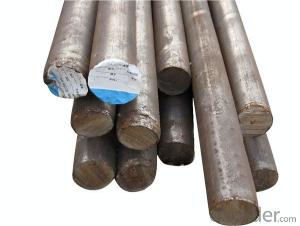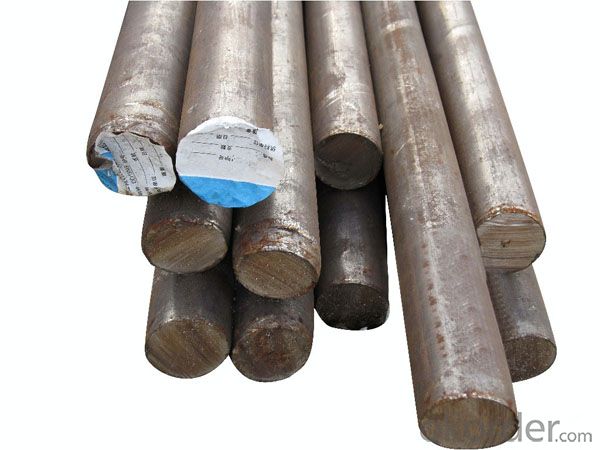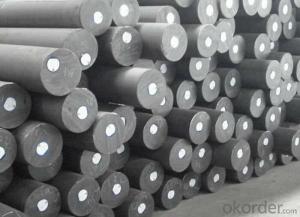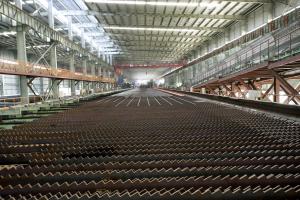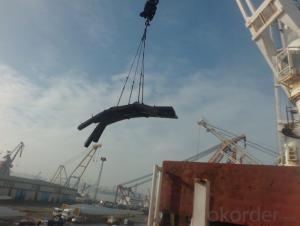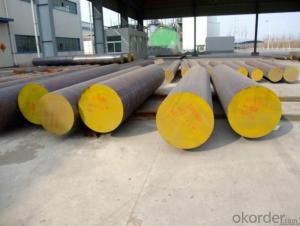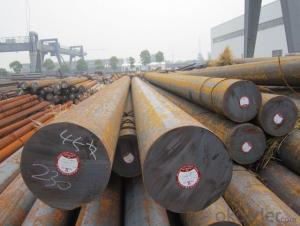Hot Rolled Carbon Steel Round Bar AISI1020
- Loading Port:
- China main port
- Payment Terms:
- TT OR LC
- Min Order Qty:
- 30 m.t.
- Supply Capability:
- 10000 m.t./month
OKorder Service Pledge
OKorder Financial Service
You Might Also Like
Specification
Hot Rolled Carbon Steel Round Bar AISI1020
Product Information:
Specifications
hot rolled carbon steel round bar
Dia 18-230mm
Grade 20,45#
Standard GB,JIS,ASTM,DIN,AISI,BS
LF & VD forge;ISO&TUV appro
Diameter: 10mm-300mm
Length: 3000mm-12000mm Straightness: 3mm/M max
Product Overviews:
| Product Name | Typical Grades | Diameter(mm) | Standard adopted |
| Carbon Steel | 20 (1020/S20C/C22) | Ø16-Ø300 | GB/SAE/JIS/DIN |
| 40 (1040/S40C/C40) | |||
| 45 (1045/S45C/C45) | |||
| Bearing Steel | GCr9 (51100/SUJ1) | Ø12-Ø250 | |
| GCr15 (52100/SUJ2/100Gr6) | |||
| GCr9SiMn (A485-Gr.1/SUJ3) | |||
| Cr-Mo Steel | 20Cr (5120/SCr420H/20Cr4) | Ø12-Ø250 | |
| 40Cr (5140/SCr440/41Cr4) | |||
| 42CrMo(4140/SCM440/42CrMo4) | |||
| Gear Steel | 20CrNiMo | Ø16-Ø600 | |
| 20CrMn(5115/SMnC420/20MnCr5) | |||
| 20CrNiMo(8620/SNCM220/20CrMiMo2) |
Product Show:

Our Advantages:
· Industry experience over 20 years.
· Shipment of goods -More than 70 countries worldwide.
· The most convenient transport and prompt delivery.
· Competitive price with best service.
· High technical production line with top quality products.
· High reputation based on best quality products.
With our experienced, enthusiastic and dynamic staffs, we assure to bring you the products with best quality, reasonable prices and good after-sales services under the motto: Friends First, Business After.
Communication, Experience, Expertise and Best efforts are our Promises to you.
- Q: What are the different forming processes for special steel?
- There are several different forming processes for special steel, including hot rolling, cold rolling, forging, extrusion, and casting.
- Q: What are the different types of coatings for special steel?
- To enhance the performance and safeguard special steel against various environmental factors, a range of coatings can be applied. The following are some commonly used coatings for special steel: 1. Zinc-based coatings: These coatings, like galvanized steel, offer exceptional corrosion resistance. By acting as sacrificial barriers, the zinc layers protect the underlying steel from rusting. 2. Epoxy coatings: Renowned for their resistance to chemicals, moisture, and abrasion, epoxy coatings find extensive use in industries where steel is exposed to harsh conditions or corrosive substances. 3. Powder coatings: Providing a durable and visually appealing finish to special steel, powder coatings are applied as dry powder and cured under heat. This process forms a tough, protective layer that resists chipping, fading, and corrosion. 4. Ceramic coatings: Ceramic coatings are celebrated for their ability to withstand high temperatures and excellent thermal insulation properties. They are commonly utilized in applications involving extreme heat or rapid temperature changes. 5. Organic coatings: Acrylics and polyurethanes are examples of organic coatings that create a protective barrier against moisture, UV radiation, and chemicals. They are frequently employed in outdoor applications, such as architectural structures or automotive parts. 6. Phosphate coatings: Primarily used as pre-treatment before applying other coatings or paints, phosphate coatings enhance adhesion and corrosion resistance in subsequent layers, resulting in a more durable finish. 7. Polymer coatings: Polymer coatings exhibit exceptional resistance to abrasion, impact, and chemicals. They are often utilized in industrial settings where steel experiences heavy wear and tear. Selecting the appropriate coating for special steel is crucial, considering the specific requirements and environmental conditions it will encounter. Each type of coating possesses its own advantages and limitations, necessitating a comprehensive analysis to determine the most suitable option.
- Q: How does special steel perform in terms of corrosion resistance?
- Special steel performs exceptionally well in terms of corrosion resistance. It is specifically designed and engineered to have enhanced resistance against corrosion compared to standard steel. This is achieved through various alloying elements and specific heat treatment processes that create a protective barrier against corrosive elements such as moisture, chemicals, and atmospheric conditions. As a result, special steel exhibits excellent durability and longevity even in corrosive environments, making it a preferred choice in industries where corrosion resistance is crucial, such as marine, oil and gas, and chemical industries.
- Q: How does special steel contribute to the longevity of products?
- There are several ways in which special steel contributes to the longevity of products. To begin with, its exceptional strength and durability are well-known. Special steel is specifically designed to endure extreme conditions, such as high temperatures, pressure, and corrosive environments. This makes it highly suitable for use in various industries, including aerospace, automotive, and construction. The remarkable strength of special steel enables products to bear heavy loads and resist deformation, ensuring they remain intact and functional for a prolonged period of time. For example, in the construction industry, special steel is frequently employed in structural components like beams and columns, which provide crucial support and stability to buildings over many years. Furthermore, special steel possesses excellent resistance to wear and abrasion. It can endure constant friction, impact, and contact with other materials without significant deterioration. This characteristic is vital in industries where products are subjected to continuous use, such as machinery, tools, and equipment. The utilization of special steel in these applications guarantees that the products remain in good working condition for an extended period, reducing the need for frequent repairs or replacements. Additionally, special steel exhibits exceptional resistance to corrosion, making it highly resistant to rust and other forms of corrosion. This property is especially advantageous in products exposed to harsh environments or chemicals, like marine vessels, pipelines, and chemical processing equipment. Through the utilization of special steel, manufacturers can significantly prolong the lifespan of these products, minimizing the risk of failure or breakdown due to corrosion. In conclusion, special steel contributes to the longevity of products through its provision of superior strength, durability, wear resistance, and corrosion resistance. Its extraordinary properties enable products to withstand harsh conditions, heavy loads, and continuous use, guaranteeing that they remain functional and reliable for an extended period. By incorporating special steel into their designs, manufacturers can greatly enhance the lifespan of their products, leading to cost savings, improved reliability, and customer satisfaction.
- Q: What are the advantages of using special steel in the marine sector?
- Using special steel in the marine sector offers numerous benefits. Firstly, special steel is renowned for its exceptional strength and durability, which is crucial in an environment that constantly exposes structures to harsh and corrosive conditions like saltwater, extreme temperatures, and constant vibrations. The high resistance to corrosion that special steel possesses makes it the perfect choice for marine applications, as it can effectively endure the corrosive effects of seawater and prevent any structural damage. In addition, special steel provides outstanding weldability, a crucial characteristic when constructing marine vessels and offshore structures. The ability to seamlessly join steel components guarantees the overall integrity and strength of the structure, effectively reducing the risk of failures or accidents. Furthermore, special steel boasts a high fatigue strength, enabling it to withstand cyclic loading for extended periods without encountering failure. This is particularly significant in the marine sector where structures endure constant dynamic loads such as waves and wind forces. The fatigue resistance of special steel ensures the longevity and reliability of marine structures, resulting in reduced maintenance costs and enhanced safety. Moreover, special steel offers design flexibility and versatility. It can be effortlessly shaped and molded into intricate and diverse forms, allowing for innovative and efficient designs in marine structures and vessels. This flexibility also allows for weight optimization, a crucial factor in the marine industry for improving fuel efficiency and reducing emissions. Lastly, special steel is readily available and cost-effective. With advancements in manufacturing processes and technologies, the production of special steel has become more efficient and affordable, making it a viable choice for the marine sector. The availability and affordability of special steel make it the preferred material for various marine applications. To conclude, the utilization of special steel in the marine sector brings forth numerous advantages, including exceptional strength and durability, resistance to corrosion, excellent weldability, high fatigue strength, design flexibility, and cost-effectiveness. These properties establish special steel as a reliable and efficient material for constructing marine structures, ensuring their longevity, safety, and operational efficiency.
- Q: What are the applications of special steel in the automotive manufacturing process?
- Special steel is used in various applications within the automotive manufacturing process. It is commonly used for the production of engine components, such as crankshafts, camshafts, and connecting rods, due to its high strength, durability, and heat resistance. Special steel is also utilized in the manufacturing of suspension systems, steering components, and transmission parts, as it provides excellent fatigue resistance and wear properties. Additionally, special steel is employed for producing safety-related components like seat belt buckles and structural reinforcements, ensuring the overall safety and reliability of vehicles.
- Q: Can special steel be used in the automotive racing industry?
- Yes, special steel can be used in the automotive racing industry. Special steel alloys, like high-strength steels or heat-resistant steels, are commonly utilized to enhance performance, durability, and safety in racing vehicles. These specialized steels offer superior strength-to-weight ratios, improved mechanical properties, and resistance to extreme temperatures, making them ideal for various automotive racing applications such as chassis, suspension components, engine parts, and exhaust systems.
- Q: How does special steel contribute to the transportation industry?
- Special steel contributes to the transportation industry by providing high-strength, lightweight, and corrosion-resistant materials for various applications. It is used in the manufacturing of automobile bodies, engine components, and structural parts, enabling vehicles to be more energy-efficient, durable, and safe. Additionally, special steel is utilized in the production of aircraft parts, railway tracks, and shipbuilding, enhancing the performance, reliability, and longevity of these modes of transportation.
- Q: What are the main factors affecting the machinability of special steel?
- The main factors affecting the machinability of special steel include the steel's composition, hardness, and microstructure. Additionally, factors such as cutting tool materials and geometry, cutting speeds, and feed rates can also significantly impact the machinability of special steel.
- Q: What are the properties of aluminum alloys?
- Aluminum alloys possess several properties that make them highly desirable in various industries. These properties include lightweight, excellent corrosion resistance, high strength-to-weight ratio, good formability, and electrical conductivity. Additionally, aluminum alloys can be easily cast, machined, and welded, making them highly versatile in different applications.
Send your message to us
Hot Rolled Carbon Steel Round Bar AISI1020
- Loading Port:
- China main port
- Payment Terms:
- TT OR LC
- Min Order Qty:
- 30 m.t.
- Supply Capability:
- 10000 m.t./month
OKorder Service Pledge
OKorder Financial Service
Similar products
Hot products
Hot Searches
Related keywords
